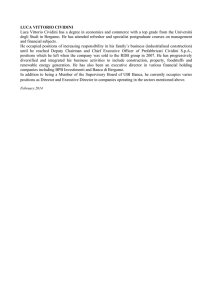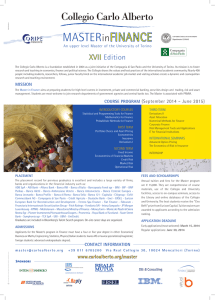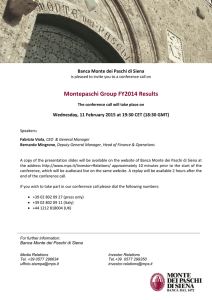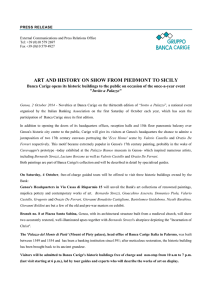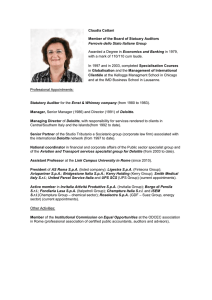CON/2014/19 - European Central Bank
advertisement
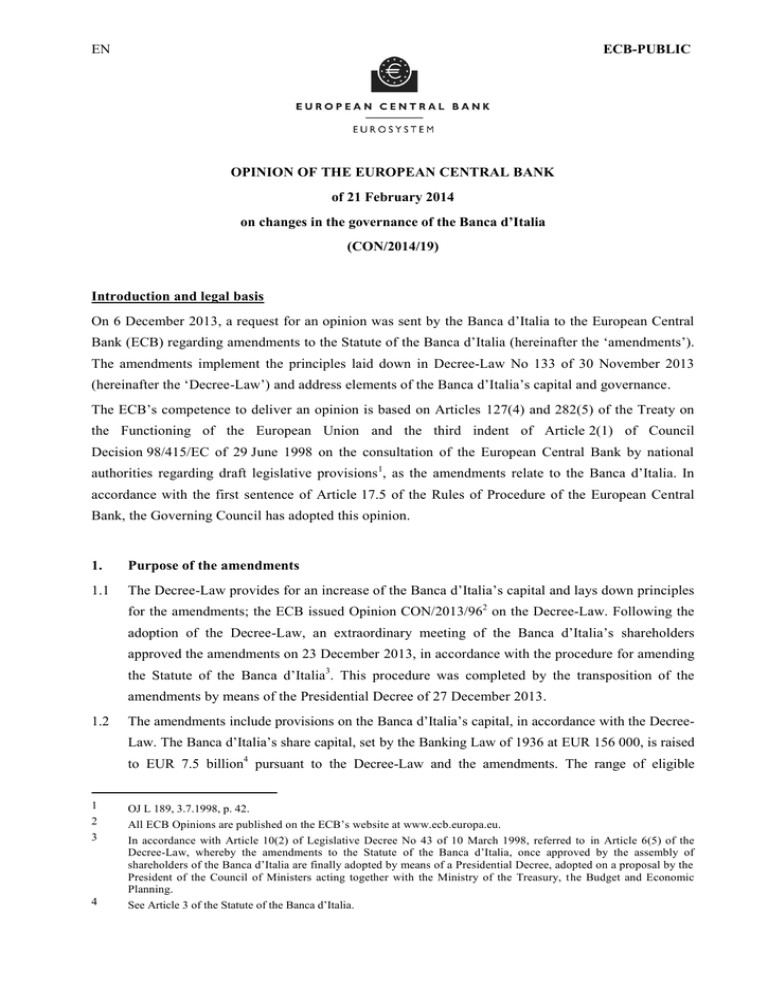
EN ECB-PUBLIC OPINION OF THE EUROPEAN CENTRAL BANK of 21 February 2014 on changes in the governance of the Banca d’Italia (CON/2014/19) Introduction and legal basis On 6 December 2013, a request for an opinion was sent by the Banca d’Italia to the European Central Bank (ECB) regarding amendments to the Statute of the Banca d’Italia (hereinafter the ‘amendments’). The amendments implement the principles laid down in Decree-Law No 133 of 30 November 2013 (hereinafter the ‘Decree-Law’) and address elements of the Banca d’Italia’s capital and governance. The ECB’s competence to deliver an opinion is based on Articles 127(4) and 282(5) of the Treaty on the Functioning of the European Union and the third indent of Article 2(1) of Council Decision 98/415/EC of 29 June 1998 on the consultation of the European Central Bank by national authorities regarding draft legislative provisions 1, as the amendments relate to the Banca d’Italia. In accordance with the first sentence of Article 17.5 of the Rules of Procedure of the European Central Bank, the Governing Council has adopted this opinion. 1. Purpose of the amendments 1.1 The Decree-Law provides for an increase of the Banca d’Italia’s capital and lays down principles for the amendments; the ECB issued Opinion CON/2013/962 on the Decree-Law. Following the adoption of the Decree-Law, an extraordinary meeting of the Banca d’Italia’s shareholders approved the amendments on 23 December 2013, in accordance with the procedure for amending the Statute of the Banca d’Italia3. This procedure was completed by the transposition of the amendments by means of the Presidential Decree of 27 December 2013. 1.2 The amendments include provisions on the Banca d’Italia’s capital, in accordance with the DecreeLaw. The Banca d’Italia’s share capital, set by the Banking Law of 1936 at EUR 156 000, is raised to EUR 7.5 billion4 pursuant to the Decree-Law and the amendments. The range of eligible 1 2 3 4 OJ L 189, 3.7.1998, p. 42. All ECB Opinions are published on the ECB’s website at www.ecb.europa.eu. In accordance with Article 10(2) of Legislative Decree No 43 of 10 March 1998, referred to in Article 6(5) of the Decree-Law, whereby the amendments to the Statute of the Banca d’Italia, once approved by the assembly of shareholders of the Banca d’Italia are finally adopted by means of a Presidential Decree, adopted on a proposal by the President of the Council of Ministers acting together with the Ministry of the Treasury, the Budget and Economic Planning. See Article 3 of the Statute of the Banca d’Italia. ECB-PUBLIC shareholders is not defined by the Statute of the Banca d’Italia which, in this respect, refers to applicable law, i.e. Article 4(4) of the Decree-Law. The Decree-Law has been converted into Law No 5 of 29 January 20145 (hereinafter the ‘Law’). In the process of conversion, the Italian Parliament made changes to the Decree-Law to the effect that only the following institutions are allowed to hold shares: (a) banks, insurance and reinsurance enterprises having their registered and head offices in Italy; (b) banking foundations established under Article 27 of Legislative Decree No 153 of 17 January 1999; and (c) Italian welfare institutions and pension funds established under Article 4(1) of the Legislative Decree No 252 of 5 December 2005. The amendments also make reference to the cap on voting rights exceeding the threshold of the Banca d’Italia’s share capital: shares exceeding such threshold must accordingly be disposed of by the time limit set by the Board of Directors, with related dividends attributed to the statutory reserves6. In accordance with the Law, the amendments also enable the Banca d’Italia to buy back its own shares from shareholders and temporarily hold them, in order to foster compliance with the limit imposed on individual shareholdings. 1.3 The amendments also transpose the provisions introduced by the Law on the economic rights attached to the shares of the Banca d’Italia capital in the Statute of the Banca d’Italia. Such economic rights consist of: (a) the value of the shares themselves; and (b) the annual dividend distributions. The maximum amount of dividends that can be distributed to shareholders from the net profit of the Banca d’Italia is capped to six per cent of its capital. Further pay-outs to shareholders from reserves, formerly granted by Article 40, are to be excluded7 in future. 1.4 The amendments also include changes to the Banca d’Italia’s governance. In particular, the minimum percentage shareholding required to call a meeting of shareholders 8, to set the agenda9 and to exercise voting rights10 are increased. The quorum for meetings is also increased11. In addition, pursuant to Article 5(2) of the Law, amended Article 16 lays down specific requirements of independence, integrity and experience for the members of the Board of Directors. These requirements are also applicable to auditors, councillors and regents12. Moreover, the Governing Board is entrusted with decision-making powers in tasks related to the European System of Central Banks (ESCB), without prejudice to the powers and duties reserved to the Governor as a member of the ECB’s decision-making bodies13. 5 6 7 8 9 10 11 12 13 See Law No 5 of 29 January 2014, published in the Gazzetta Ufficiale della Repubblica Italiana No 23, 29.01.2014. The ECB was not consulted on the amendments to the Decree-Law. See Article 3(4) of the Statute of the Banca d’Italia. It should however be noted that, in line with Article 6(5)(c) of Law No 5 of 29 January 2014, for an interim period lasting no longer than 36 months starting from completion of capital increase, shares exceeding the 3% threshold shall not bestow voting rights but shall attribute related dividends. See Article 6(5)(b) of Law No 5 of 29 January 2014. Article 6(3) of the Statute of the Banca d’Italia. Article 7(2) of the Statute of the Banca d’Italia. Article 9(1) of the Statute of the Banca d’Italia. Article 10(1) of the Statute of the Banca d’Italia. Article 20(2), 28(2) and 31(1) of the Statute of the Banca d’Italia. Articles 22 and 25 of the Statute of the Banca d’Italia. 2 ECB-PUBLIC 2. The appropriate time to consult the ECB The request for an opinion on the draft amendments was sent by the Banca d’Italia on 6 December 2013. The request stated that the Board of Directors’ meeting had been convened for 20 December 2013. The amendments were approved by the shareholders’ extraordinary meeting on 23 December 2013 and then transposed by means of a Presidential Decree on 27 December 2013 published in the Gazzetta Ufficiale on 31 December 2013 and taking effect from the same date. In accordance with Article 3(4) of Decision 98/415/EC, the process of adoption of the amended Statute of the Banca d’Italia should have been suspended pending submission of the ECB’s opinion. The ECB would like to draw the attention of the national authorities to the proper procedure for consultation. 3. General observations 3.1 The issues of financial independence of the Banca d’Italia and the necessity for the Banca d’Italia’s reserves to be gradually replenished over an appropriate period of time and up to the amount deemed necessary to safeguard the value of the Banca d’Italia’s capital and assets were specifically addressed in Opinion CON/2013/96. Such observations, insofar as relevant for the present purposes, also apply to the amendments. 3.2 The ECB understands that buy-back operations may be carried out by the Banca d’Italia in order to enable shareholders to comply with the limit imposed on shareholdings and that contracts to this effect may be entered into by the Banca d’Italia. Situations, limits, procedures and conditions will be specified by the Banca d’Italia’s Board of Directors in agreement with its Board of Auditors. The ECB observes that, in doing so, the Board of Directors will take as a point of reference the safeguard of the Banca d’Italia’s capital and that the purchase price may not exceed the nominal value of the shares. The ECB also notes that the voting rights of the shares subject to the buy-back will be suspended. Such shares will be computed for the purpose of duly constituting the shareholders’ meeting, whereas they will not be taken into account in the calculation of majorities required to approve resolutions. 3.3 In view of the foregoing considerations, the ECB understands that the Banca d’Italia will decide on such buy-back operations prudently and with due regard to its own financial considerations. 3.4 The ECB notes that, pursuant to Article 3(6) of the Statute of the Banca d’Italia, the buying and selling of transactions shall be carried out in accordance with the principle of transparency and equal treatment of potentially interested parties. It is for the Commission to assess whether the amendments that the Italian legislator made to the Decree-Law, imposing a nationality requirement with regard to shareholders, comply with European Union law. 3 ECB-PUBLIC 4. Institutional and financial independence 4.1 Financial independence, which is an aspect of the principle of central bank independence referred to in Article 130 of the Treaty, concerns, inter alia, the profit allocation rules of a national central bank (NCB). An NCB’s statute may prescribe how its profits are to be allocated. In the absence of such provisions, decisions on the allocation of profits should be taken by the NCB’s decision-making bodies on professional grounds, and should not be subject to the discretion of third parties unless there is an express safeguard clause stating that this is without prejudice to the financial means necessary for carrying out the NCB’s ESCB-related tasks as well as national tasks14. 4.2 In particular, Article 7 of the Statute of the Banca d’Italia provides for the power of the shareholders to approve the allocation of the net profits in accordance with profit allocation rules laid down in the amended Article 40. These rules provide that the allocation of net profits is determined by the Board of Directors acting on a proposal from the Governing Board following consultation with the Board of Auditors, and is to be presented for approval at the shareholders’ meeting. Net profits are distributed to: (a) ordinary reserves up to 20 per cent of net profits; (b) shareholders up to 6 per cent of the capital; (c) extraordinary reserves and provisions up to a maximum of 20 per cent of net profits; and (d) the State for the remaining sum. The ECB understands that, should the ordinary reserves be reduced to offset losses, net profits will be allocated to the ordinary reserves until the ordinary reserves are replenished15. As consistently noted by the ECB16, profits may be distributed to the State budget only after any accumulated losses from previous years have been covered, and financial provisions deemed necessary to safeguard the real value of the NCB’s capital and assets have been created. The ECB takes note of Article 40(3) of the Statute of the Banca d’Italia, which lays down general principles on the replenishment of ordinary reserves, and expects the Banca d’Italia to interpret these principles adequately, in accordance with the principle of financial independence. In addition, the ECB understands that a provision for general risks shall cover the risks deriving from the overall operations of the Banca d’Italia, and that this provision shall be funded taking into account the general risk level17. 4.3 The ECB also welcomes the amendment to Article 6 of the Statute of the Banca d’Italia, which requires that the shareholders’ meeting does not interfere in any way with matters pertaining to the exercise of ESCB-related tasks, and understands that this provision reaffirms the Governor’s and the Governing Board’s exclusive competence on matters related to the exercise of ESCBrelated tasks. 14 15 16 17 See the ECB’s Convergence Report 2013, p. 26. Article 40(3) of the Statute of the Banca d’Italia. See the ECB’s Convergence Report 2013, p. 25. Article 41(2) of the Statute of the Banca d’Italia. 4 ECB-PUBLIC 5. Personal independence 5.1 As regards conflicts of interest, the ECB notes in its Convergence Reports that, as a matter of principle, membership of a decision-making body involved in the performance of ESCB-related tasks is incompatible with the exercise of other functions that might create a conflict of interest. In particular, members of such decision-making bodies may not hold an office or have an interest that may influence their activities, whether through office in the executive or legislative branches of the state or in regional or local administrations, or through involvement in a business organisation. The ECB welcomes the reference made in Article 43 of the Statute of the Banca d’Italia to the codes of ethics applicable to staff members and the members of the Governing Board, which lays down general principles on independence and impartiality, ceilings on the acceptance of gifts, conflicts of interest, confidentiality and continuance of duties after cessation of employment. 5.2 Article 18 of the Statute of the Banca d’Italia contains an explicit provision concerning the grounds for dismissal of members of the Governing Board, other than the Governor, by reference to Article 14.2 of the Statute of the European System of Central Banks and of the European Central Bank. The members of the Governing Board, other than the Governor, must have the right to submit any decision to dismiss them to an independent court of law, in order to limit the potential for political discretion in evaluating the grounds for their dismissal. The ECB understands that this right is made available under Italian law on the basis of overriding principles of constitutional law and relevant procedural rules. However, for reasons of legal certainty, it would be advisable to refer to such a right of review in the Statute of the Banca d’Italia18. 6. Independence of the Banca d’Italia for prudential supervision The ECB also understands that the amendment to Article 6 of the Statute of the Banca d’Italia, by requiring that the shareholders’ meeting does not interfere in any way with the matters relating to the exercise of the public functions entrusted to the Banca d’Italia by Union law, would also encompass the future performance of the Banca d’Italia’s supervisory tasks, including future tasks related to the Single 18 See for example the ECB’s Convergence Report 2013 p. 24. 5 ECB-PUBLIC Supervisory Mechanism (SSM), and thus be in accordance with the principle of independence of supervisors19, and the requirement for national competent authorities to act independently within the SSM, as enshrined in Article 19 of Council Regulation No. 1024/2013 20. This opinion will be published on the ECB’s website. Done at Frankfurt am Main, 21 February 2014. [signed] The President of the ECB Mario DRAGHI 19 20 See Principle 2 of the Core Principles for Effective Banking Supervision. See also paragraph 5.3 of Opinion CON/2013/71. Council Regulation (EU) No 1024/2013 of 15 October 2013 conferring specific tasks on the European Central Bank concerning policies relating to the prudential supervision of credit institutions (OJ L 287, 29.10.2013, p. 63). 6


